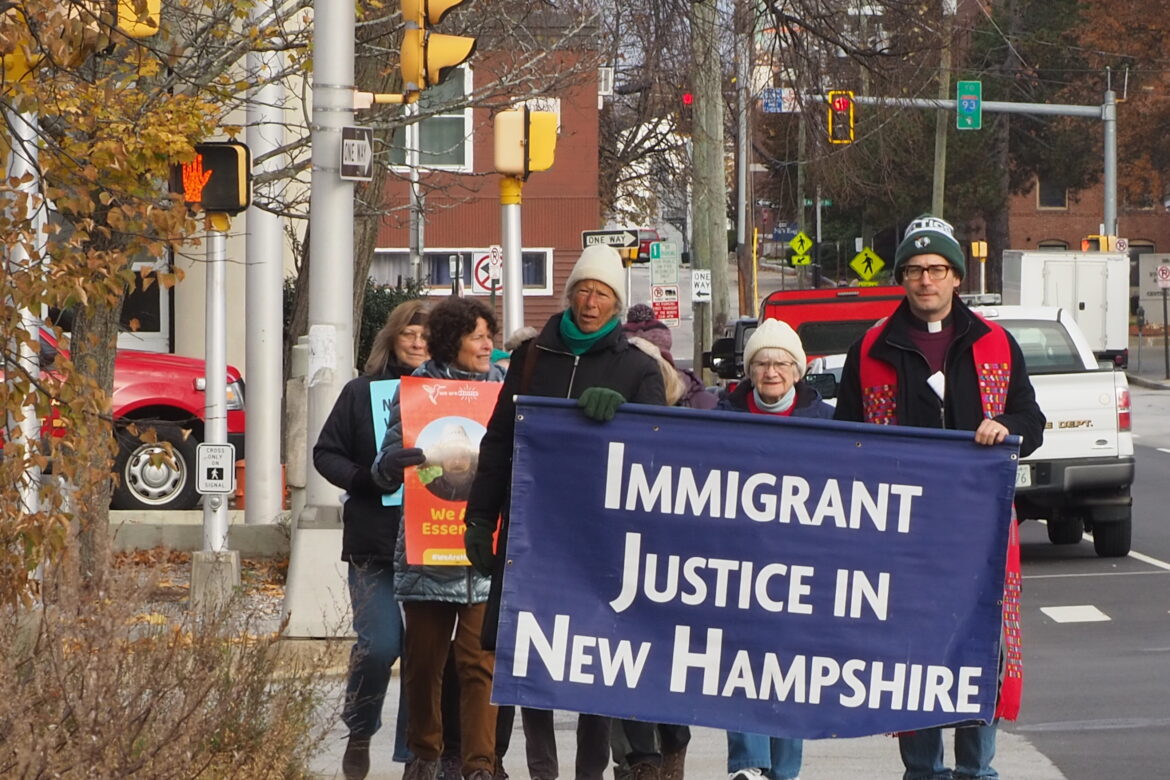By Arnie Alpert, Active with the Activists
It did not take long for immigrants’ rights defenders, peace groups, and faith leaders to register opposition to Gov. Chris Sununu’s request for $850,000 to fund the dispatch of New Hampshire National Guard troops to the Texas-Mexico border.
“New Hampshire needs affordable housing, substance use treatment, mental health resources, and much more—and Granite Staters have made it clear that using taxpayer dollars on immigration enforcement is not a wise nor supported use of that money,” said a statement released Wednesday by dozens of community leaders and organizations, including the American Friends Service Committee, ACLU of NH, Rights and Democracy, NH Peace Action, 350NH, and the Granite State Organizing Project.
Sununu’s request will go to the legislature’s Joint Fiscal Committee on Friday morning. In his letter to the committee, Sununu said the special appropriation would “facilitate a state active-duty operation of the New Hampshire National Guard in support of security activities at the southern United States border to protect New Hampshire citizens from harm.”
According to the governor, who said he was briefed by Texas’ Governor Greg Abbot, “Fentanyl is pouring in, human trafficking is occurring unabated, and individuals on the terrorist watch list are coming in unchecked.”
But the activist groups, who plan to deliver their statement to the Fiscal Committee on Friday, say, “Using taxpayer dollars to send New Hampshire National Guard members to Texas is only designed to score political points and does nothing to improve quality of life in New Hampshire. Funding cruelty at the border is not what our state stands for.”
The statement bears the names of dozens of faith leaders in addition to advocacy groups.
“Billions of taxpayer dollars are already being spent to deter, detain and deport people at the southern border,” commented Grace Kindeke of the American Friends Service Committee. “I have visited the southern border in Texas and in California,” she said, “and the on-the-ground reality is that people coming here are desperate for help; local communities are woefully underfunded and severely under resourced and yet still find ways to offer humanitarian aid and simple compassion to migrants.”
“Instead of working in partnership to coordinate and invest in the type of infrastructure that can humanely process people,” Kindeke added, “Governor Sununu continues to perpetuate the falsehood that Congress doesn’t already funnel billions into border security and ignores repeated calls from his own constituency to fully invest in the services NH people need to build and thrive within a safe community.”
The dispute about enforcement measures at the southern border parallel one set off by Sununu’s creation of a Northern Border Alliance to police the border between New Hampshire and Quebec, where data recently obtained by the ACLU indicates the degree of unauthorized border crossings is insignificant. Many of the same activist groups are seeking to put limits on the northern border force’s operations, while the governor’s political allies are trying to expand anti-immigrant measures.
Sununu sent more than 150 Guard members to the Texas border region in 2022, which he said at the time was in response to “a humanitarian crisis.” That deployment, too, prompted protest by faith leaders who said, “There is indeed a humanitarian crisis at the border. Many ordinary, law-abiding people have been forced to flee their home countries due to shocking violence directed at them and their families, as well as the impact of climate change.” From their perspective, the Guard deployment exacerbated the crisis instead of relieving it. Rev. Jason Wells said the governor never responded to their request for a meeting.
The controversial use of the National Guard for political purposes is also reminiscent of the actions of the current Governor Sununu’s father. In 1986, Governor John H. Sununu sent National Guard members to Honduras, where road construction maneuvers were criticized as part of the Reagan Administration’s preparation for a possible invasion of Nicaragua.
According to the National Immigration Forum, most of the fentanyl and other illegal drugs which enter the United States from Mexico come through official Points of Entry, “contrary to common belief that they are smuggled between ports of entry, particularly in areas without fencing or other physical barriers.”
The governor’s latest request has drawn opposition from Democratic leaders, including Rep. Mary Jane Wallner, a Fiscal Committee member, who said, “Rather than pushing for real solutions and backing the bipartisan border legislation that passed the U.S. Senate, Governor Sununu and Donald Trump want to play up the crisis at the southern border to sow fear and division in an election year.”
Arnie Alpert spent decades as a community organizer/educator in NH movements for social justice and peace, including a year as a member of the Clamshell Alliance office collective. Officially retired since 2020, he keeps his hands (and feet) in the activist world while writing about past and present social movements.





